2019-2020年七年级英语下册 Unit 2 We love all four seasons教案 上海牛津版
人教版2019-2020年七年级英语下册Unit 2单元阅读专练(含答案)
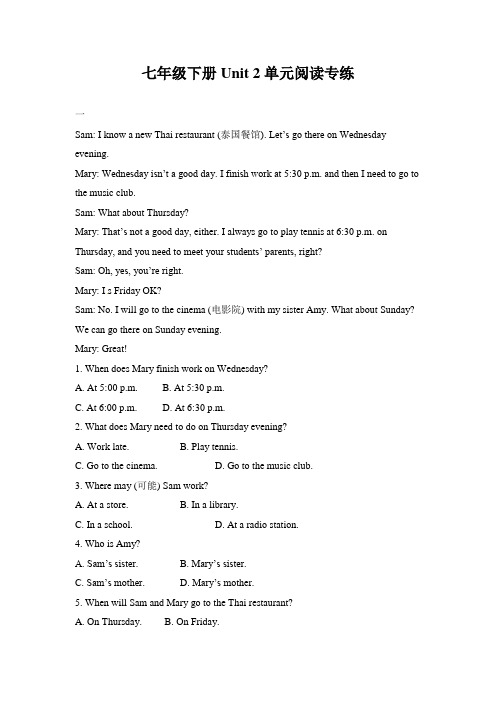
七年级下册Unit 2单元阅读专练一Sam: I know a new Thai restaurant (泰国餐馆). Let’s go there on Wednesday evening.Mary: Wednesday isn’t a good day. I finish work at 5:30 p.m. and then I need to go to the music club.Sam: What about Thursday?Mary: That’s not a good day, either. I always go to play tennis at 6:30 p.m. on Thursday, and you need to meet your students’ parents, right?Sam: Oh, yes, you’re right.Mary: I s Friday OK?Sam: No. I will go to the cinema (电影院) with my sister Amy. What about Sunday? We can go there on Sunday evening.Mary: Great!1. When does Mary finish work on Wednesday?A. At 5:00 p.m.B. At 5:30 p.m.C. At 6:00 p.m.D. At 6:30 p.m.2. What does Mary need to do on Thursday evening?A. Work late.B. Play tennis.C. Go to the cinema.D. Go to the music club.3. Where may (可能) Sam work?A. At a store.B. In a library.C. In a school.D. At a radio station.4. Who is Amy?A. Sam’s sister.B. Mary’s sister.C. Sam’s mother.D. Mary’s mo ther.5. When will Sam and Mary go to the Thai restaurant?A. On Thursday.B. On Friday.C. On Saturday.D. On Sunday.二Mr. Wang is our English teacher. He is more than (多于) fifty years old. He is tall and thin with black hair. He has a big nose and small eyes. He always wears a pair of glasses. He often wears a dark blue jacket and black pants. He is strict (严格的) at his work, but he is kind to us. He teaches English well. He often makes us laugh in his class. We all think English is very interesting. We all like him very much, too.1. How old is Mr. Wang?A. 50B. 45C. more than 50D. 382. What does Mr. Wang look like?A. tallB. shortC. niceD. heavy3. What does he always wear?A. a watchB. a pair of glassesC. a hatD. a sweater4. What color is his jacket?A. blackB. greenC. blueD. white5. How do the students think of Mr. Wang?A. He is interestingB. He is kindC. He teaches English.D. He is smart.三、My uncle Mike is a music teacher. He never gets up very late. He usually gets up at five o’clock in the morning. After he brushes his teeth, he often plays baseball with my aunt. Then he eats his breakfast. After that, he often plays the violin. At about 7:50, he takes the number 6 bus to his school. He has no classes on Thursday and Friday. He usually goes to the violin club. There he helps kids with the violin. Oh, my brother plays the violin very well. Do you love to play the violin? Do you want to join the violin club? Please call my uncle at 116-3886.根据短文内容,判断下列句子正误。
2019-2020年七年级英语下册 Module 3 Unit 2 We
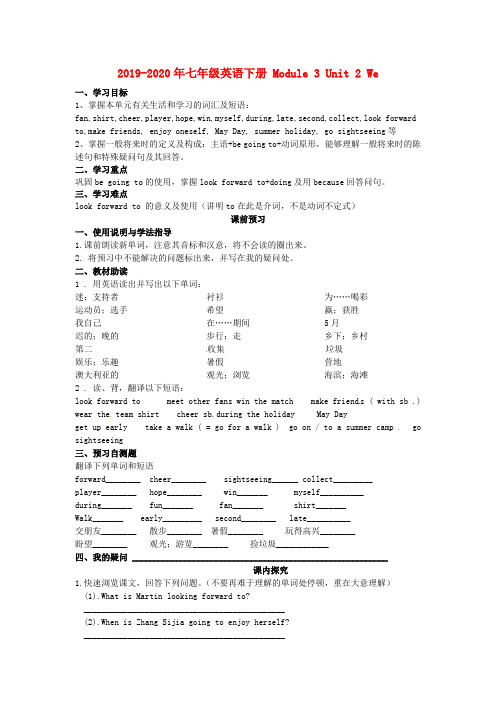
2019-2020年七年级英语下册 Module 3 Unit 2 We一、学习目标1、掌握本单元有关生活和学习的词汇及短语:fan,shirt,cheer,player,hope,win,myself,during,late,second,collect,look forward to,make friends, enjoy oneself, May Day, summer holiday, go sightseeing等2、掌握一般将来时的定义及构成:主语+be going to+动词原形,能够理解一般将来时的陈述句和特殊疑问句及其回答。
二、学习重点巩固be going to的使用,掌握look forward to+doing及用because回答问句。
三、学习难点look forward to 的意义及使用(讲明to在此是介词,不是动词不定式)课前预习一、使用说明与学法指导1.课前朗读新单词,注意其音标和汉意,将不会读的圈出来。
2. 将预习中不能解决的问题标出来,并写在我的疑问处。
二、教材助读1 . 用英语读出并写出以下单词:迷;支持者衬衫为……喝彩运动员;选手希望赢;获胜我自己在……期间 5月迟的;晚的步行;走乡下;乡村第二收集垃圾娱乐;乐趣暑假营地澳大利亚的观光;浏览海滨;海滩2 . 读、背,翻译以下短语:look forward to meet other fans win the match make friend s ( with sb .) wear the team shirt cheer sb.during the holiday May Dayget up early take a walk ( = go for a walk ) go on / to a summer camp go sightseeing三、预习自测题翻译下列单词和短语forward________ cheer________ sightseeing______ collect_________player________ hope________ win_______ myself__________during_______ fun_______ fan_______ shirt_______Walk_______ early_________ second________ late__________交朋友________ 散步________ 暑假________ 玩得高兴________盼望________ 观光;游览________ 捡垃圾____________四、我的疑问 __________________________________________________________课内探究1.快速浏览课文,回答下列问题。
七年级英语下册:Module 3 Unit 2 We love all four seasons Period 1-2学案(上海牛津版)
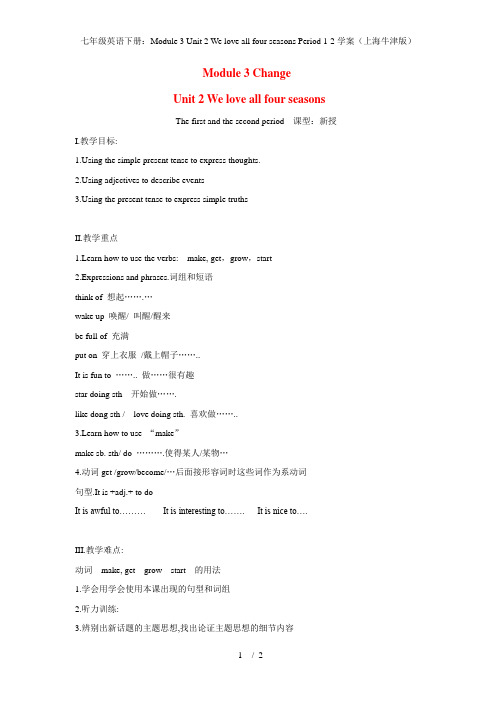
Module 3 ChangeUnit 2 We love all four seasonsThe first and the second period 课型:新授I.教学目标:ing the simple present tense to express thoughts.ing adjectives to describe eventsing the present tense to express simple truthsII.教学重点1.Learn how to use the verbs: make, get,grow,start2.Expressions and phrases.词组和短语think of 想起…….…wake up 唤醒/ 叫醒/醒来be full of 充满put on 穿上衣服/戴上帽子……..It is fun to …….. 做……很有趣star doing sth 开始做…….like dong sth / love doing sth. 喜欢做……..3.Learn how to use “make”make sb. sth/ do ……….使得某人/某物…4.动词get /grow/become/…后面接形容词时这些词作为系动词句型.It is +adj.+ to doIt is awful to……… It is interesting to……. It is nice to….III.教学难点:动词make, get grow start 的用法1.学会用学会使用本课出现的句型和词组2.听力训练:3.辨别出新话题的主题思想,找出论证主题思想的细节内容4.听一篇文章能听取获得明确的信息IV.课后巩固Choice:1.How are you feeling today? I am ______better todayA. veryB. more c. many D. much2.The students look _____at the picture and they seem to be very _______.A. happily happyB. happily happilyC. happy happyD. happy happily3.Take it easy! You don’t do ______.A. something wrongB. nothing wrongC. anything wrongD. wrong anything4.Which season do you prefer, spring or summer? I prefer spring ______summer.5.A .I don’t like going out in s ummer.B.I don’t like going out in summer,______A too B. also C. either D. neitherII. Rewrite the sentence as required1. Wendy was tall and thin. (对划线部分提问)_______ _______Wendy_______ _______?2. The picture on the left is drawn by Mark. (对划线部分提问)______ ______ is drawn by Mark.?3. Nanjing Road Walkway looks very beautiful at night.(感叹句)_______ __________ Nanjing Road Walkway looks at night!。
牛津上海版英语七下《Unit 2 We love all four seasons》PPT课件
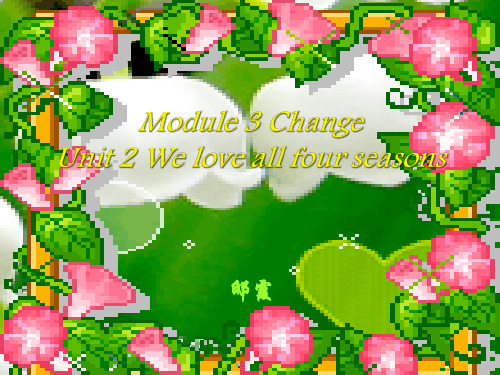
snowy, cold 5
What does spring make you think of
2020年10月2日
6
2020年10月2日
7
Tell me what you can think
of spring.
The weather starts _g_e_tt_i_n_g_ warm.
Plants and flowers start _g_r_o_w_i_n_g_ .
一 年之际在于春。
2020年10月2日
13
演讲完毕,谢谢观看!
Thank you for reading! In order to facilitate learning and use, the content of this document can be modified, adjusted and printed at will after downloading. Welcome to download!
Easter is in spring. It is nice to celebrate this festival bcyhogciovlaitneg eaegcghs other ________ ________.
2020年10月2日
12
The whole year’s work depends on a good start in spring.
汇报人:XXX 汇报日期:20XX年10月10日
2020年10月2日
14
邸霞
2020年10月2日
1
What season is it?
spring
• What does it make you think of ?
七年级下册英语人教版u2课文
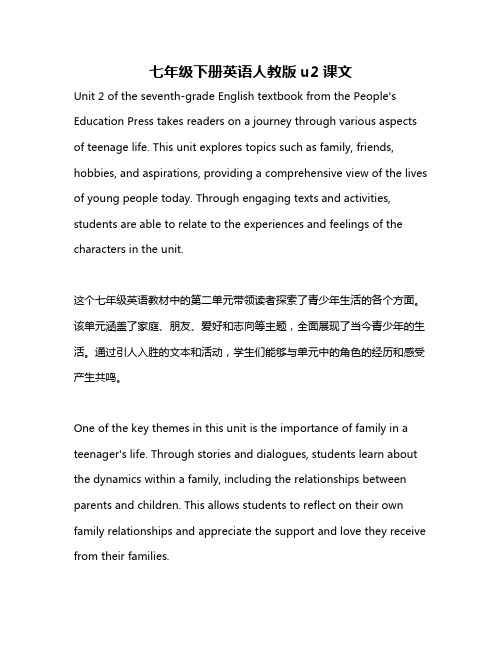
七年级下册英语人教版u2课文Unit 2 of the seventh-grade English textbook from the People's Education Press takes readers on a journey through various aspects of teenage life. This unit explores topics such as family, friends, hobbies, and aspirations, providing a comprehensive view of the lives of young people today. Through engaging texts and activities, students are able to relate to the experiences and feelings of the characters in the unit.这个七年级英语教材中的第二单元带领读者探索了青少年生活的各个方面。
该单元涵盖了家庭、朋友、爱好和志向等主题,全面展现了当今青少年的生活。
通过引人入胜的文本和活动,学生们能够与单元中的角色的经历和感受产生共鸣。
One of the key themes in this unit is the importance of family in a teenager's life. Through stories and dialogues, students learn about the dynamics within a family, including the relationships between parents and children. This allows students to reflect on their own family relationships and appreciate the support and love they receive from their families.该单元中的一个重要主题是家庭在青少年生活中的重要性。
七年级下册英语第2单元课文
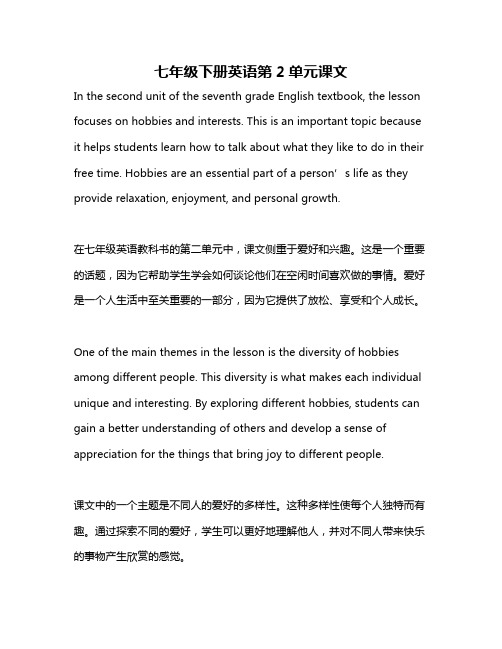
七年级下册英语第2单元课文In the second unit of the seventh grade English textbook, the lesson focuses on hobbies and interests. This is an important topic because it helps students learn how to talk about what they like to do in their free time. Hobbies are an essential part of a person’s life as they provide relaxation, enjoyment, and personal growth.在七年级英语教科书的第二单元中,课文侧重于爱好和兴趣。
这是一个重要的话题,因为它帮助学生学会如何谈论他们在空闲时间喜欢做的事情。
爱好是一个人生活中至关重要的一部分,因为它提供了放松、享受和个人成长。
One of the main themes in the lesson is the diversity of hobbies among different people. This diversity is what makes each individual unique and interesting. By exploring different hobbies, students can gain a better understanding of others and develop a sense of appreciation for the things that bring joy to different people.课文中的一个主题是不同人的爱好的多样性。
这种多样性使每个人独特而有趣。
通过探索不同的爱好,学生可以更好地理解他人,并对不同人带来快乐的事物产生欣赏的感觉。
七年级下册英语m2u2课文知识点
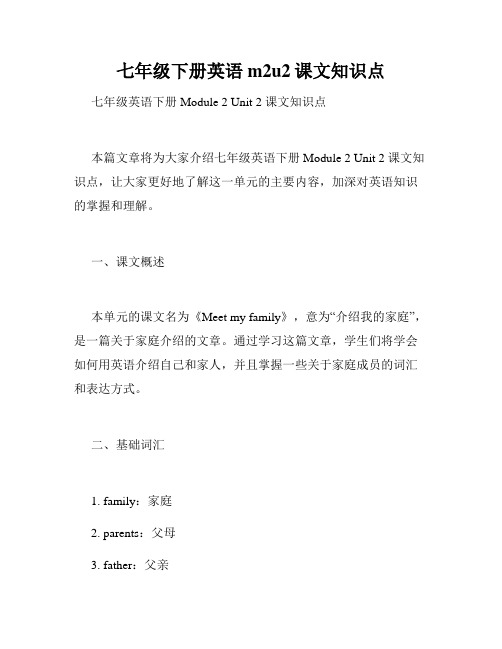
七年级下册英语m2u2课文知识点七年级英语下册 Module 2 Unit 2 课文知识点本篇文章将为大家介绍七年级英语下册 Module 2 Unit 2 课文知识点,让大家更好地了解这一单元的主要内容,加深对英语知识的掌握和理解。
一、课文概述本单元的课文名为《Meet my family》,意为“介绍我的家庭”,是一篇关于家庭介绍的文章。
通过学习这篇文章,学生们将学会如何用英语介绍自己和家人,并且掌握一些关于家庭成员的词汇和表达方式。
二、基础词汇1. family:家庭2. parents:父母3. father:父亲4. mother:母亲5. brother:兄弟6. sister:姐妹7. grandparents:祖父母8. grandfather:祖父9. grandmother:祖母10. aunt:姑妈、阿姨11. uncle:叔叔、舅舅12. cousin:表兄弟/表姐妹三、重点句型1. This is my family.(这是我的家人。
)2. These are my parents.(这是我的父母。
)3. I have a brother/sister.(我有一个兄弟/姐妹。
)4. My grandparents live in the countryside.(我的祖父母住在乡下。
)5. My aunt works in a bank.(我的姑妈在银行工作。
)6. My uncle is a doctor.(我的叔叔是一名医生。
)四、重点语法本单元的语法重点是“可数与不可数名词”和“物主代词”。
可数和不可数名词英语中的名词分为可数和不可数名词两种。
可数名词指可以数的名词,如“book、chair、app le”等;不可数名词指不能数的名词,如“milk、water、money”等。
物主代词物主代词是指用来代替名词的词语,如“my、your、his、her、its、our、their”等。
2019年人教版英语七年级下册 unit 2附答案

2019年人教版英语七年级下册 unit 2Ⅰ.单项选择1.I always play basketball to relax myself______Saturdays.A.onB.inC.atD.by2.We have breakfast_____7:30_____the morning.A.on:atB.at;inC.in;onD.in;at3.-What time_____Lily brush her teeth?-At 7:00.A.doesB.doesn'tC.isD.do4.-_____do you eat lunch?-At 12:00.A.What timeB.WhoC.WhyD.Where5.-_____-Sorry,I don't have a watch.A.What time is it?B.What's the weather like?C.What time do you usually go to school?6.Gary is the best singer in my class. No one else____so well.A.singsB.sangC.will singD.is singing7.-I am very tired.I just want to go to bed.-You'd better_____first and then have a rest.A.take a messageB.take a showerC.take a walkD.take a break8.Tony is_____late for class. And he is always the first one to arrive at school.A.sometimesB.neverC.alwaysually9.Dumplings are very delicious._____of my parents like them.A.AllB.BothC.NoneD.Neither10.He is a____man and he likes telling jokes. His jokes always make us laugh.A.funnyB.tiredC.strictD.shy11.Don't drive your car so_____.It's dangerous. Please drive slowly.A.quicklyB.slowlyC.sadlyD.happily12.Dick never eats vegetables, so he doesn't have a_____life.A.happyB.healthyC.interestingD.sad13.The tall man_____yellow is my uncle and his name is Tony.A.wearsB.dressesC.inD.puts on14.These oranges look nice, but_____very sour.A.feelB.tasteC.soundD.look15.Skimming is a kind of reading strategy. It means reading an article____to find the main idea without reading every word.A.quicklyB.carefullyC.clearlyⅡ.完形填空Many students like 16 very much. But 17 Monday to Friday, they must go to school. Thus, on Saturdays and Sundays they stay at home and 18 TV from morning to night. They don't know it's bad for their eyes. Children usually like to eat fish, meat and chicken,but they don't like vegetables 19 fruit. They don't know 20 more vegetables and fruit is better than eating meat.At school, the children only do 21 minutes of sports or 22 do any sports. The teachers must know it isn't good for 23 health.We always think of ways to keep 24 .We must eat 25 vegetables and fruit, and do enough(足够的)sports every day.16.A.watch TV B.watch the TV C.watching TV D.watching the TV17.A.on B.and C.from D.to18.A.watch B.see C.read D.look19.A.and B.with C.or D.but20.A.buying B.eating C.getting D.keeping21.A.a few B.few C.little D.a little22.A.often B.sometimes ually D.never23.A.them B.they C.their D.theirs24.A.health B.healthy C.busy D.free25.A.more B.much C.a lot D.fewⅢ.阅读理解AA.Her mother.B.Her uncle.C.Her father.D.Her sister.27.What does Dong Yi do at 10:00 a.m.?A.Play chess.B.Do her homework.C.Do the morning exercise.D.Have classes.28.When does Dong Yi have dinner?A.At 5:10 p.m.B.At 7:00 p.m.C.At 7:10 p.m.D.At 10:00 p.m.BHi, I'm Tony. Every day, my parents and I are very busy.My parents get up at 6:00 in the morning. And I get up at 6:30.We often have breakfast at 7:OO.We always have some bread and milk for breakfast. Sometimes we have noodles and eggs.Then we go to school or work. I walk to school and my parents go to work by bus.I have lunch at school.In the afternoon, I come back from school at 5:00.My parents get home at 5:20.We have dinner at about 6:30.Then I do my homework and my parents watch TV .We are all busy, but we are happy.29.What time do Tony's parents get up?A.At 5:00.B.At 6:00.C.At 6:30.D.At 7:00.30.Tony and his parents always have some_______and milk for breakfast.A.vegetablesB.riceC.chickenD.bread31.Where does Tony have lunch?A.In a shop.B.At school.C.In the park.D.At home.CMy cousin Jeff is only thirteen years old. But he is a good student and a successful musician. He usually gets up at six ten. He has breakfast at seven o'clock. He goes to school at a quarter to eight. He usually walks to school. It takes about ten minutes. At twelve o'clock, he has a quick lunch at school. After lunch, he plays the guitar with his friends.Jeff and his friends are in a music club. After school,they take the number 201 bus to their club. In the club, he helps children play the guitar for two hours. He works very well. The children love him a lot. He usually gets home at about six o'clock. He has dinner with his parents at six thirty in the evening. After dinner, Jeff and his parents listen to music, because they all love music. And they go to bed at about half past nine in the evening.32.What time does Jeff go to school?A.At 7:45.B.At 8:15.C.At 7:15.D.At 8:45.33.How does Jeff go to the club?A.He walks to the club.B.He rides his bike to the club.C.He takes the bus to the club.D.He takes the car to the club.34.Which of the following is TRUE according to the passage?A.It takes Jeff 20 minutes to get to school.B.After lunch, Jeff and his friends go to the music club.C.Jeff eats dinner with his parents at 6:30 in the evening.D.Jeff’s family all love music. They can play the guitar very well.35.Which would be the best title for the passage?A.Jeff’s lifeB.Jeff and his friendsC.Jeff’s familyD.A successful musicianⅣ.任务型阅读请先阅读下面短文,掌握其大意,然后根据短文内容从下面方框的七个选项中,选择五个适当的句子还原到短文中,使短文意思通顺、结构完整。
七年级英语下册 Module 3 Unit 2 We love all four seasons知识
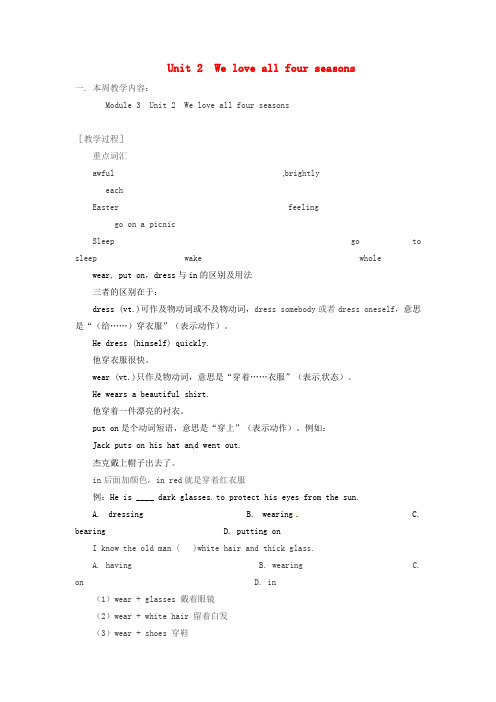
Unit 2 We love all four seasons一. 本周教学内容:Module 3 Unit 2 We love all four seasons[教学过程]重点词汇awful brightlyeachEaster feelinggo on a picnicSleep go to sleep wake whole wear, put on,dress与in的区别及用法三者的区别在于:dress (vt.)可作及物动词或不及物动词,dress somebody或者dress oneself,意思是“(给……)穿衣服”(表示动作)。
He dress (himself) quickly.他穿衣服很快。
wear (vt.)只作及物动词,意思是“穿着……衣服”(表示状态)。
He wears a beautiful shirt.他穿着一件漂亮的衬衣。
put on是个动词短语,意思是“穿上”(表示动作)。
例如:Jack puts on his hat an d went out.杰克戴上帽子出去了。
in后面加颜色,in red就是穿着红衣服例:He is ____ dark glasses to protect his eyes from the sun.A. dressingB. wearingC. bearingD. putting onI know the old man ( )white hair and thick glass.A. havingB. wearingC. onD. in(1)wear + glasses 戴着眼镜(2)wear + white hair 留着白发(3)wear + shoes 穿鞋not…until意思是“直至某时才做某事”She didn't arrive until 6 o'clock.她直到6点才到。
Don't get off the bus until it has stopped.公共汽车停稳后再下车。
七年级英语下册 Module 3 Unit 2 We love all four seasons教案
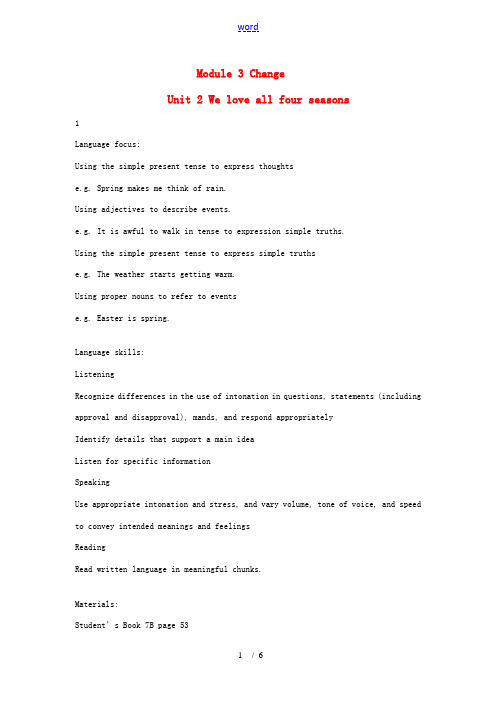
Module 3 ChangeUnit 2 We love all four seasons1Language focus:Using the simple present tense to express thoughtse.g. Spring makes me think of rain.Using adjectives to describe events.e.g. It is awful to walk in tense to expression simple truths.Using the simple present tense to express simple truthse.g. The weather starts getting warm.Using proper nouns to refer to eventse.g. Easter is spring.Language skills:ListeningRecognize differences in the use of intonation in questions, statements (including approval and disapproval), mands, and respond appropriatelyIdentify details that support a main ideaListen for specific informationSpeakingUse appropriate intonation and stress, and vary volume, tone of voice, and speed to convey intended meanings and feelingsReadingRead written language in meaningful chunks.Materials:Student’s Book 7B page 53Cassette 7B and a cassette playerPreparation:Cue the cassette.Pre-task preparationLanguage learning activity(This section aims at providing students with opportunities to practise the language/vocabulary needed or bee familiar with the background for the task that follows.1. Play the recording: Look and read. Stop after Picture2. Students listen and follow in their books.2. Play the recording again. Students listen and repeat.3. Ask: What does spring make you think of ? to elicit: Spring makes me think of … Encourage students to volunteer anything that es to mind. Help them write a list on the board. Then draw a spidergram like the one i n the Student’s Book and invite a more able student to e forward and plete the spidergram with the information given on the list.ConsolidationGrammar Practice Book 7B page 41.2Language focus:Using the simple present tense to express simple truthse.g. In writer, the weather starts getting cold and dry.Using adjectives to show quantitiese.g. Some leaves bee brown, red or yellow.Using adjectives to describe eventse.g. It is fun to go to the beach in summer.Language skills:ListeningIdentify the main ideas of a new topicIdentify details that support a main ideaListen for specific informationSpeakingUse appropriate intonation and stress, and vary volume, tone of voice, and speed to convey intended meanings and feelingsReadingRead written language in meaningful chunksRecognize recurrent patterns in language structureSkim a text to obtain a general impression and the main ideas.WritingDevelop written texts by expressing own ideas and feelingsWrite out piece of work by presenting writing using appropriate layout and visual support including illustrations, tables, charts where necessaryMaterials:Student’s Book 7B pages 53 and 54Cassette 7B and a cassette playerWorkbook 7B page 27Photocopiable pages 47 and 48Preparation:Cue the cassette. Make a copy of Photocopiable pages 47 and 48 for each student.Pre-task preparation1. Play the rest of the recording for Look and read. Students listen and follow in their books.2. Play the recording again. Students listen and repeat.3. Write the following adjectives: awful, interesting, nice, fun, important, had and dangerous on the board. Ask for students’ opinions: Is it awful/interesting/nice/fun/important/bad/dangerous to … ?4. Write three verbs: start, like and love on the board. Say: I start working at 8 a.m. I like walking to school. I have doing exercise. Ask: What form of verb should we use after ‘start’, ‘like’ and ‘love’? to elicit: We should use the-ing form of verb. Invite a few of the more able students to think of some more sample sentences using the three verbs.Post-task activityWorkbook page 27ConsolidationGrammar Practice Book 7B pages 42 and 43.3Language focus:Asking ‘Wh-’ questions to find out about a specific objecte.g. Which one could be the first slide?Using adjectives to show order.e.g. Picture 2 could be the first slide.Using the simple present tense to express preferencese.g. I prefer Picture 11 to Picture 4.Language skills:SpeakingOpen an interaction by eliciting a response by asking questionsMaintain an interaction by agreeing or disagreeing, replying.Maintain an interaction by asking and responding to others’ opinionsWritingGather and share information, idea and language by using strategies such as brainstorming, listing.Plan and organize information and ideas by deciding on the sequence of content Develop written texts by expressing own ideas and feelingsRevise and edit drafts by sharing work with teachers and classmates and responding positively to their suggestions on ideas and use of language.Materials:Student’s Book 7B page 55Cassette 7B and a cassette playerWorkbook 7B page 28Photocopiable page 49Preparation:Cue the cassette. Make a copy of Photocopiable page 49 for each student.Pre-task preparation1. Introduce the two new lan guage structures to students: ‘either… or…’ and ‘prefer … to …’ To introduce the first structure, say: I’ve lost my pen. It could either be in the staff room or in the laboratory. To introduce the second structure, say: I prefer coffee to tea. Give a few more examples you can think of.2. Also review the ordinal and cardinal numbers with students if necessary.Post-task activityWorkbook page 28ConsolidationGrammar Practice Book 7B page 44,46 and 47.。
- 1、下载文档前请自行甄别文档内容的完整性,平台不提供额外的编辑、内容补充、找答案等附加服务。
- 2、"仅部分预览"的文档,不可在线预览部分如存在完整性等问题,可反馈申请退款(可完整预览的文档不适用该条件!)。
- 3、如文档侵犯您的权益,请联系客服反馈,我们会尽快为您处理(人工客服工作时间:9:00-18:30)。
教案上海牛津版
一、单元分析(Unit Analysis)
(一)单元地位(Unit Position)
1 本课出现了用形容词表示数量,“Some leaves bee brown, red, or yellow.”可结
合most, all ,none, 等相似的形容词进行比较并加以操练。
2 本课出现了用序数词作形容词表示顺序,Picture 2 could be the first slide. 教师
对序数词和基数词作适当的归纳总结。
3 用含有“哪一个”词语的问句辨别某一特定物品,”Which one could be the first
slide?”
(二)单元目标(Unit Target)
1 运用一般现在时态表示想法,“Spring makes me think of rain.”
2 运用形容词描写事物, “It is awful to walk in the streets when the weather is
wet.”
3用专有名词表示事物, “Easter is in spring.”
4运用一般现在时态表示一个普遍真理, “In winter, the weather starts getting cold and dry.”
5用一般现在时态表示喜好, “I prefer Picture 11 to Picture 4.”
(三)单元重点(Unit Points)
1 关键词:
1)重要结构: a) It is +adj. to do sth.
b) When 引导的时间状语从句(在将来时间范围内)
c) either…or
d) prefer… to
2)重点短语:make sb. do sth./sleep for the whole winter/start doing sth./love doing sth./like doing sth./wake up/put on/buy sth. for sb.
3)连系动词; bee a little stronger/get warm/look very different
3)副词修饰动词:blow gently/shine brightly/swim happily/rain heavily
2 功能:
1)用含有“哪一个”词语的问句辨别某一特定物品。
A: Which one could be the first slide?
B: Picture 2 could be the first slide.
2)用一般现在时态表示想法。
A: What does spring make you think of?
B: Spring makes me think of rain.
3 知识点和语法点:
●基数词、序数词的用法。
●prefer… to…与like... better than ...的相互转换。
●动词+ing的形式。
●either …or与neither...nor...的区别。
二、教学设计(Teaching Designs)
What does spring make you think of?
What does summer make you think of?
[链接2]
课文可参考图片:
[链接3]
A: What does spring make you think of?
B: It makes me think of rain.
A: What do you do in spring?
B: I love/like doing… (but ) sometimes it is interesting to …。
